Finding school sports records represents one of the most critical yet challenging tasks facing athletic directors, coaches, historians, and sports enthusiasts today. Whether you’re searching for a decades-old track record, documenting championship achievements, verifying historical performances, or preserving athletic legacy for future generations, locating accurate sports records requires understanding where to look, how to verify information, and increasingly, how to modernize record-keeping systems for long-term accessibility.
Yet many schools struggle with fragmented record systems—achievements scattered across paper documents in file cabinets, fading physical record boards, old program booklets in storage boxes, incomplete online databases, and institutional memory residing solely with long-retired coaches. Meanwhile, current athletes break records without full knowledge of the performances they’re surpassing, families seek information about alumni athletic careers, and schools lose irreplaceable historical data to physical deterioration and institutional turnover.
This comprehensive guide explores proven strategies for finding school sports records across all sources, best practices for preservation and verification, and modern solutions for making athletic achievements permanently accessible to current and future generations.
Athletic records tell the stories of exceptional performances, championship seasons, individual excellence, and program evolution. Schools that excel at finding, preserving, and displaying sports records create stronger connections between past and present while motivating current athletes to pursue their own place in institutional history.

Digital record systems make finding and accessing school sports records easier while ensuring permanent preservation
Understanding School Sports Records: Types and Categories
Effective record searching begins with understanding what types of athletic records exist and where they’re typically maintained.
Individual Performance Records
Individual athletic achievements represent the most commonly tracked school sports records:
Event-Specific Records by Sport
- Track and field records across all running, jumping, and throwing events
- Swimming and diving records for each stroke and distance
- Cross country course records and championship times
- Wrestling records by weight class and tournament level
- Basketball individual game and season scoring records
- Football passing, rushing, and receiving records
Career Achievement Records
- Career scoring totals across all sports
- Career assists, rebounds, and defensive statistics
- Multi-year performance achievements
- Consecutive game streaks and participation records
- Career win totals for individual sports like tennis and golf
Understanding how digital record boards systematically organize these individual achievements helps schools create comprehensive tracking systems.
Team Performance Records
Team records document collective achievements and program milestones:
Seasonal Team Records
- Best win-loss records by sport and season
- Championship appearances and titles
- Winning and losing streaks
- Team scoring records for single games and seasons
- Defensive records and shutout achievements

Team records and championship history deserve equal prominence alongside individual achievements
Championship and Tournament Records
- State championship victories and appearances
- Conference and league title records
- Tournament performance history
- Playoff appearance records
- Regional and national competition results
Schools implementing comprehensive basketball records recognition programs understand the importance of documenting both individual and team achievements.
Coaching and Staff Records
Coaching achievements represent essential components of athletic history:
Career Coaching Records
- Career win totals and winning percentages
- Championship titles and tournament victories
- Years of service and program tenure
- Coaching milestone achievements
- Post-season appearance records
Program Leadership History
- Athletic director tenures and achievements
- Assistant coach contributions
- Trainer and support staff legacy
- Administrative leadership impact on program development
Traditional Sources for Finding School Sports Records
Locating historical sports records requires systematic investigation across multiple traditional sources.
Physical Record Boards and Trophy Cases
Traditional physical displays remain valuable record sources:
Accessing Physical Record Information
- Athletic facility record boards displaying event records
- Gymnasium and field house recognition displays
- Trophy case documentation and plaques
- Banner and pennant historical information
- Hallway displays commemorating achievements
Physical record boards face significant limitations—they deteriorate over time, offer limited space, and become difficult to update. Learn about football records recognition approaches that maintain accessibility.
Documentation Considerations
- Photograph physical records systematically for backup documentation
- Record exact wording, dates, and names as displayed
- Note any obvious errors or inconsistencies requiring verification
- Document physical condition and deterioration concerns
- Create spreadsheets organizing information from physical displays
School Archives and Athletic Department Files
Institutional archives represent comprehensive record sources when properly maintained:
Athletic Department Record Systems
- Athletic director files and historical documentation
- Coaching records and season summaries
- Meet results and competition documentation
- Individual athlete performance records
- Championship certificates and official results
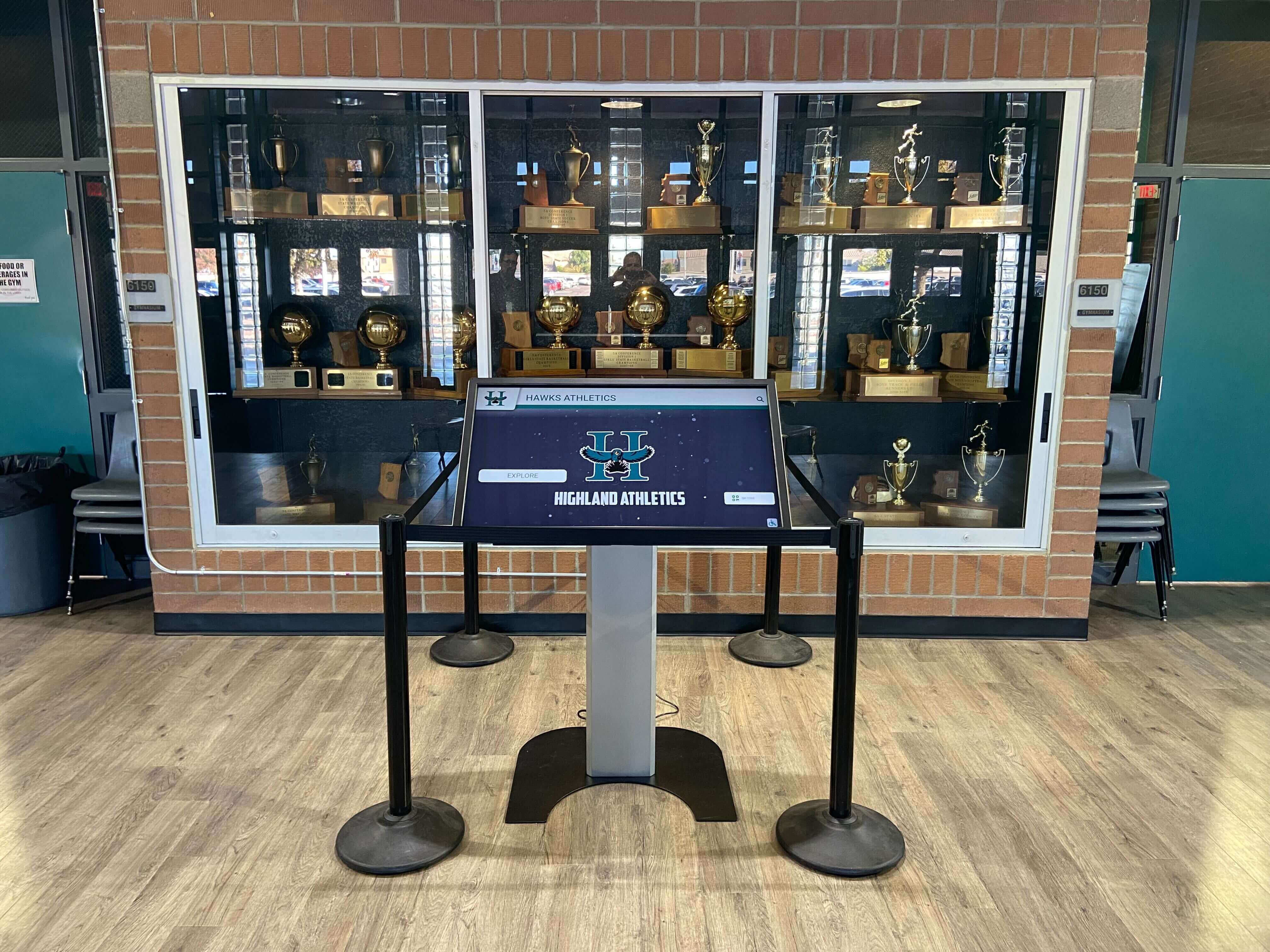
Modern digital systems complement traditional archives while ensuring permanent accessibility
School Library and Historical Society Resources
- Yearbook collections documenting athletic achievements
- School newspaper archives reporting sports results
- Historical photograph collections
- Alumni association records and publications
- Special collections focused on athletics
Many schools discover that comprehensive athletics wall of honor programs require extensive archival research to establish accurate historical records.
Media Records and Publications
Local media coverage provides extensive sports record documentation:
Newspaper Archives
- Local newspaper sports section coverage
- Championship game reports and season summaries
- Individual performance feature articles
- Record-breaking achievement announcements
- Historical sports page documentation
Program and Publication Resources
- Game programs from significant competitions
- Athletic department media guides
- Championship program booklets
- Alumni publications and magazines
- Sports information office historical files
Institutional Memory: Interviews with Long-Time Community Members
Human sources provide irreplaceable historical context:
Key Interview Candidates
- Retired coaches with decades of program knowledge
- Long-serving athletic trainers and support staff
- Former athletic directors and administrators
- Alumni athletes from different eras
- Long-time community members and sports reporters
Effective Interview Strategies
- Prepare specific questions about records and achievements
- Record interviews for future reference
- Cross-reference information with documented sources
- Collect photographs and memorabilia during interviews
- Document stories and context surrounding record performances
Modern Digital Resources for Finding Sports Records
Contemporary digital platforms revolutionize access to athletic records and performance data.
National and State Athletic Record Databases
Official record-keeping organizations maintain comprehensive databases:
National Federation of State High School Associations (NFHS) According to the NFHS National Records, the National High School Sports Record Book, first published in 1979 and now available online at www.nfhs.org, catalogs outstanding performances across 16 sports. The NFHS compiles records based only upon competitions its state affiliates sanction, including scholastic dual meets, high-school-only invitationals, and championship meets through individual state championships.
State High School Athletic Associations
- State-level record books for all sanctioned sports
- Championship history and results databases
- All-state and all-conference historical rosters
- Individual school performance tracking
- State qualification standards and records
Each state athletic association maintains online resources documenting championship results and state records, providing essential context for school-level achievement verification.
Sport-Specific Tracking Platforms
Specialized platforms provide detailed performance tracking:
Athletic.net for Track, Cross Country, and Swimming According to Athletic.net documentation, this platform allows athletes to track their own improvements and see where they stack up from grade level to school all-time to state and national rankings. Athletic.net automatically maintains records lists for teams, including season records by athlete and event, as well as school records by grade level, with automatic updates after each official meet.

Modern tracking platforms integrate with digital displays creating comprehensive record systems
MaxPreps for Multi-Sport Coverage MaxPreps serves as America’s source for high school sports, providing rankings, stat leaderboards, schedules, scores, news, and comprehensive coverage of high school teams and players across multiple sports. Schools can claim their pages and contribute historical information.
MileSplit for Running Sports MileSplit United States provides comprehensive coverage of high school running, cross country, and track and field, including rankings, race results, statistics, news, photos, and videos specific to distance running sports.
School Website and Online Archives
Many schools now maintain digital athletic records:
Athletic Department Websites
- Historical records sections documenting achievements
- Current season statistics and record progressions
- Hall of fame information and inductee databases
- Championship history pages
- Coach and athlete profile archives
Digital Yearbook Archives
- Ancestry.com and other genealogy sites hosting yearbook collections
- School-specific digital archives
- Public library digital collections
- State historical society online resources
Schools developing sports achievement highlights for their websites discover the value of systematically organizing historical records for online accessibility.
Best Practices for Verifying School Sports Records
Accuracy in record-keeping requires systematic verification processes.
Cross-Referencing Multiple Sources
Never rely on single-source documentation:
Multi-Source Verification Process
- Compare physical record board information with archived results
- Cross-reference newspaper reports with official meet results
- Verify timing system records for track and swimming performances
- Check state association databases against school records
- Compare yearbook documentation with contemporary newspaper coverage
Resolving Conflicting Information
- Prioritize official competition results over secondary sources
- Consider timing system changes affecting performance comparisons
- Account for rule changes and competition standard modifications
- Document uncertainties and conflicting claims transparently
- Establish “best available information” standards when definitive verification proves impossible
Understanding Historical Context and Rule Changes
Athletic records require historical perspective:
Rule and Equipment Changes Affecting Records
- Track and field timing changes from hand-timing to fully automatic timing (FAT)
- Swimming pool length standardization affecting performance comparisons
- Equipment changes in throwing events and pole vault
- Basketball three-point line distance modifications
- Football overtime rule implementations
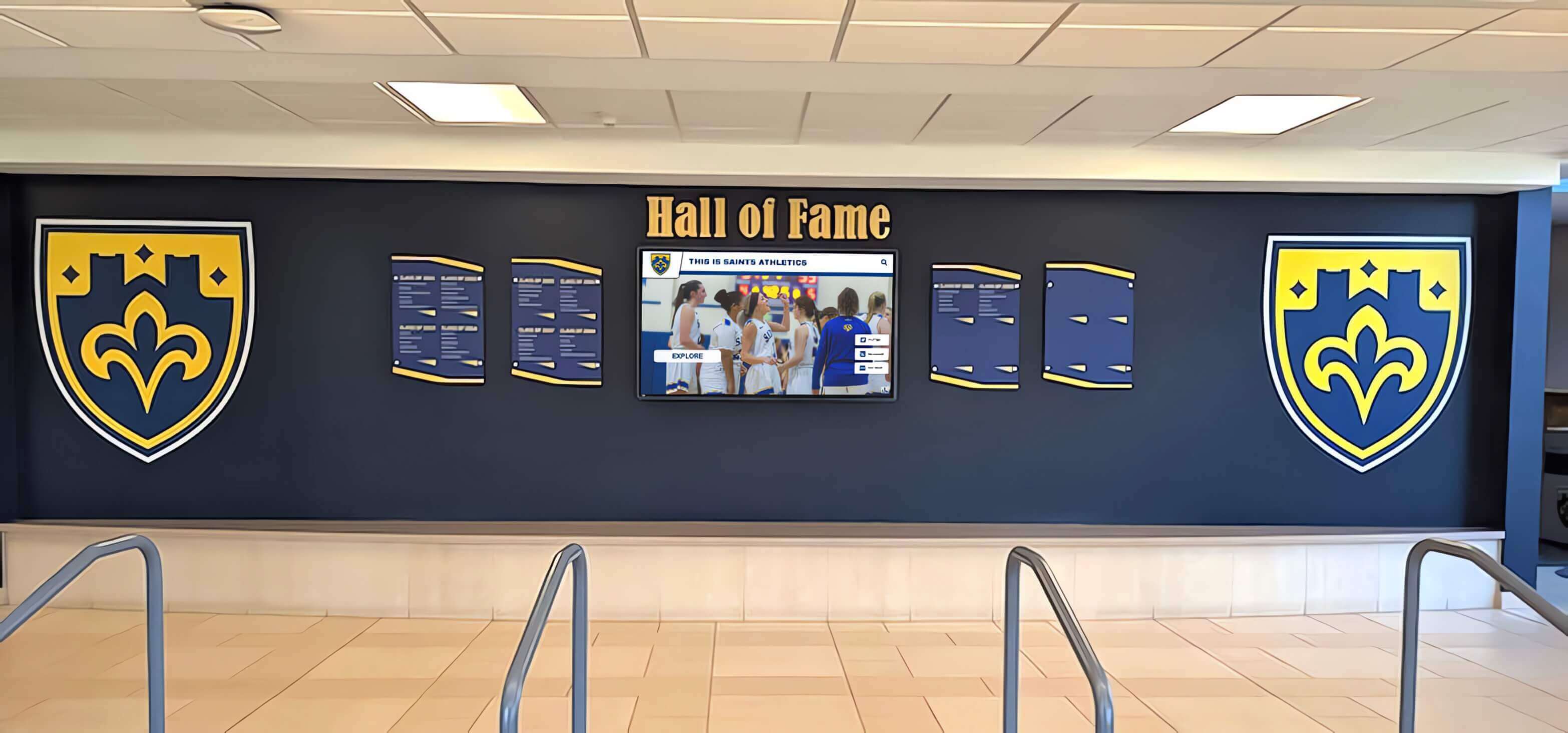
Modern record systems preserve historical context while accommodating rule and standard changes
Competition Standard Evolution
- Changes in state qualification standards over time
- Conference realignment affecting competition levels
- Classification system modifications
- Season length and competition format changes
Establishing Documentation Standards
Systematic record documentation ensures long-term accuracy:
Essential Documentation Elements
- Athlete name with proper spelling verification
- Complete performance details with units and measurements
- Date of achievement with full year specification
- Competition location and meet name
- Competition level (dual meet, invitational, conference, state, etc.)
- Verification source and documentation references
Photographic and Video Documentation
- Photograph record boards systematically
- Digitize historical photographs of record performances
- Preserve video documentation of championship performances
- Scan historical documents and newspaper clippings
- Create digital archives with proper metadata and organization
Schools implementing digital record boards for high schools benefit from integrated documentation standards that ensure comprehensive verification.
Preserving School Sports Records: Modern Solutions
Permanent preservation requires transitioning from fragile physical formats to secure digital systems.
Digital Archiving and Cloud Storage
Modern technology enables permanent record preservation:
Comprehensive Digital Archive Development
- Scan all paper records, newspaper clippings, and photographs
- Create organized digital file systems with logical folder structures
- Implement consistent naming conventions for all files
- Utilize high-resolution scanning for photograph preservation
- Back up digital archives to multiple cloud storage locations
Metadata and Organization Systems
- Tag files with searchable keywords and categories
- Include date, sport, athlete, and record type metadata
- Create databases linking files to athlete and performance records
- Implement version control for updated information
- Document sources and verification information
Cloud Storage Best Practices
- Use multiple cloud storage providers for redundancy
- Implement automated backup systems
- Establish access controls and permissions
- Create disaster recovery plans
- Maintain local backup copies alongside cloud storage
Interactive Digital Record Board Systems
Solutions like Rocket Alumni Solutions transform how schools preserve and display athletic records:
Unlimited Digital Record Capacity Digital recognition displays overcome the fundamental space limitations that force schools to choose which achievements receive visibility:
- Single display showcases unlimited records across all sports and time periods
- No need to remove historical records to accommodate current achievements
- Comprehensive archives preserving complete institutional athletic history
- All sports and achievement categories receive equal display capacity
- Easy expansion as programs add new sports and records

Digital displays provide unlimited capacity for showcasing records across all sports and eras
Real-Time Updates and Accessibility Modern digital systems eliminate the delays and challenges of physical record updates:
- Update records instantly as new achievements occur
- Remote management from any internet-connected device
- No need for physical access to update displays
- Multiple administrators can manage content with appropriate permissions
- Scheduled updates for season records and championships
Interactive Search and Exploration Digital platforms make finding specific records effortless:
- Search functionality enabling users to find athletes, sports, or years instantly
- Filter records by sport, time period, or achievement type
- View detailed athlete profiles with complete career statistics
- Access photographs, videos, and achievement documentation
- Compare performances across different eras with historical context
Many schools implementing comprehensive record preservation discover that professional athletes recognition displays create engaging connections between school records and post-graduation athletic achievements.
Simple Content Management Cloud-based systems eliminate technical barriers to record maintenance:
- Intuitive interfaces requiring no technical expertise
- Bulk import tools for historical record data
- Template systems ensuring consistent formatting
- Drag-and-drop media management
- Role-based permissions enabling appropriate staff access
Schools report 80-90% reduction in time spent managing athletic records after implementing digital systems.
Web-Based Record Access
Athletic records should extend beyond physical campus locations:
Online Record Portals
- Alumni worldwide can access school athletic records
- Mobile-optimized displays for smartphone and tablet access
- Social sharing capabilities for record achievements
- Integration with school athletic websites
- Public access promoting community engagement

Web-based systems enable record access from any device, anywhere in the world
Benefits of Web Accessibility
- Families can view records without visiting campus
- Media access for coverage and research
- Recruiting tools showcasing program history
- Alumni engagement with institutional athletic tradition
- Permanent accessibility unaffected by building access or hours
Sport-Specific Record Finding Strategies
Different sports require tailored approaches to record documentation and verification.
Track and Field Records
Track and field presents unique record-keeping challenges:
Event-Specific Documentation Requirements
- Distinguish between hand-timed and fully automatic timing (FAT)
- Document indoor versus outdoor records separately
- Note altitude for performances at non-sea-level venues
- Specify relay team member names and running order
- Record wind readings for sprints and horizontal jumps
Common Track Record Sources
- State association meet results databases
- Athletic.net historical performance data
- Timing system archives from major meets
- State record progression lists
- Historical newspaper coverage of championship performances
Swimming and Diving Records
Aquatic sports require specific verification considerations:
Pool Configuration Documentation
- Clearly distinguish 25-yard, 25-meter, and 50-meter records
- Note short course versus long course designations
- Document relay team compositions
- Record diving board height specifications
- Specify competition level and meet name
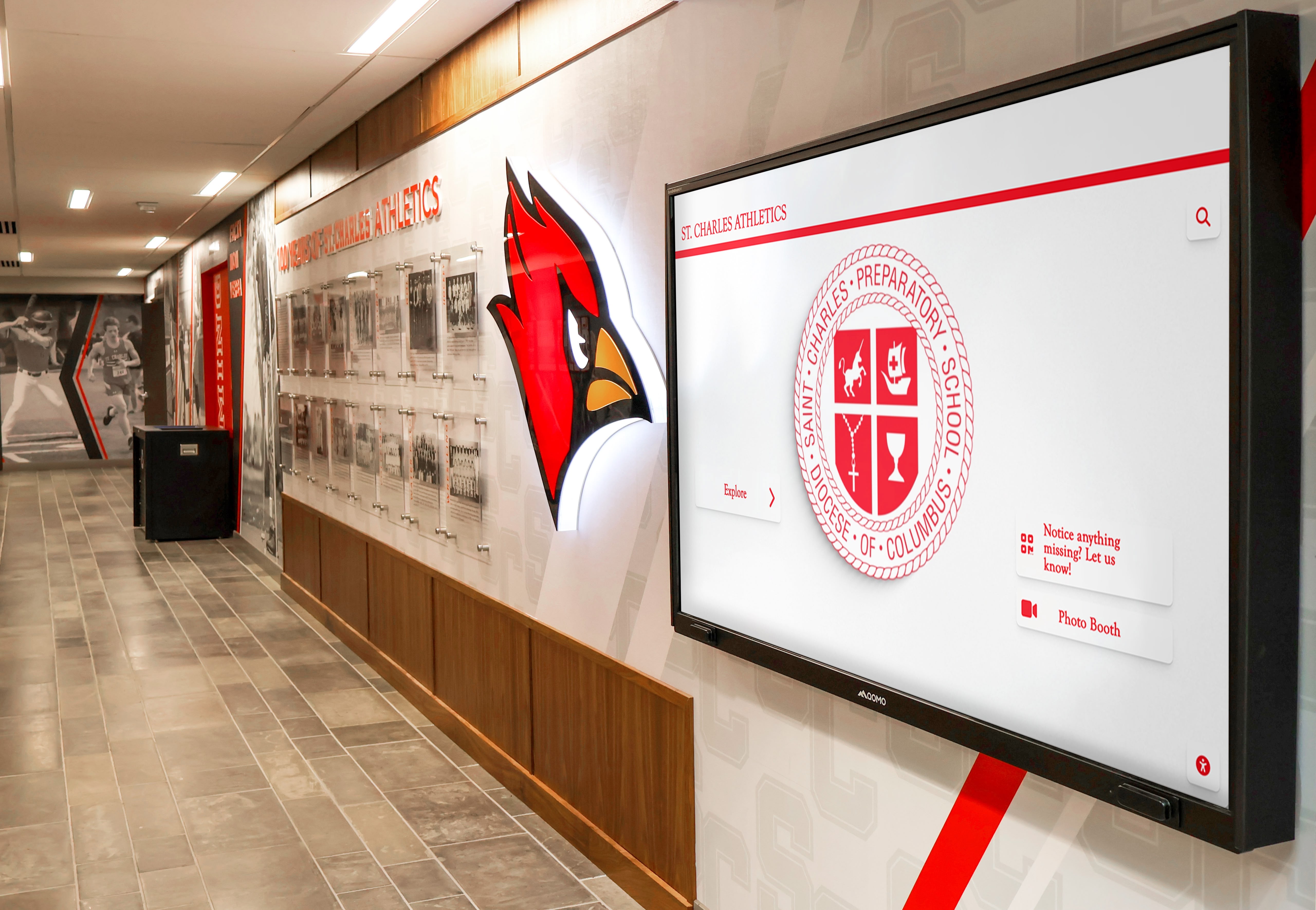
Sport-specific record organization helps athletes understand and pursue meaningful achievements
Swimming Record Verification
- State high school association championship results
- USA Swimming time databases
- Meet results posted on swimming timing system websites
- Conference championship documentation
- Historical newspaper meet coverage
Team Sport Records
Basketball, football, soccer, and other team sports present different documentation challenges:
Statistical Record Verification
- Official scorebook documentation
- State association tournament statistics
- Conference record-keeping systems
- MaxPreps historical statistics
- Newspaper box scores and game summaries
Championship and Season Records
- State association historical records databases
- School yearbook season summaries
- Athletic director championship documentation
- Media guide historical sections
- Banner and plaque physical documentation
Understanding comprehensive school pride initiatives reveals how properly documented records contribute to institutional identity and community engagement.
Creating Comprehensive School Sports Record Systems
Effective record systems require systematic planning and implementation.
Conducting Athletic History Audits
Begin with thorough assessment of existing records:
Inventory Existing Record Sources
- Document all physical record boards and their current condition
- Catalogue trophy cases and plaque collections
- Review athletic department filing systems
- Survey library and archive holdings
- Identify key interview candidates with institutional memory
Assess Current Record-Keeping Systems
- Evaluate how current records are documented
- Review update processes and responsibilities
- Identify gaps and inconsistencies in existing records
- Analyze accessibility of current record information
- Determine preservation and backup systems
Establishing Record-Keeping Protocols
Systematic processes ensure consistent record management:
Record Verification Standards
- Define what constitutes an official school record
- Establish verification requirements for record claims
- Create processes for updating records as they’re broken
- Determine how historical records will be researched and verified
- Document procedures for resolving conflicting information

Systematic record-keeping processes ensure accurate documentation of all athletic achievements
Assignment of Responsibilities
- Designate record-keeping responsibilities by sport
- Train coaches on documentation requirements
- Establish athletic director oversight protocols
- Create backup documentation systems
- Schedule regular record system audits
Integration with Recognition Programs
Athletic records should connect with broader recognition initiatives:
Hall of Fame Integration
- Link record holders to hall of fame profiles
- Feature record-breaking performances in induction ceremonies
- Create historical context showing record progression
- Highlight multiple record holders in single athlete profiles
- Connect team records to championship team recognition
Multi-Sport Recognition Systems
- Create unified platforms showcasing records across all sports
- Implement seasonal highlighting of current sport records
- Feature record progressions and near-record performances
- Connect individual records to team achievements
- Integrate records with athlete profile systems
Many schools discover that comprehensive approaches to showcasing student achievement naturally incorporate athletic record recognition alongside academic and extracurricular accomplishments.
Technology Solutions for Record Management
Modern platforms eliminate traditional record-keeping challenges while creating engaging display experiences.
Digital Record Board Features
Contemporary systems provide comprehensive functionality:
Core Capabilities
- Unlimited record storage across all sports and time periods
- Instant updates as new records are established
- Search and filter functionality for easy record finding
- Detailed athlete profiles with photographs and career statistics
- Historical archives preserving decades of achievements
Advanced Features
- Automated record tracking comparing performances to existing standards
- Integration with statistical platforms pulling current season data
- Video integration showcasing record-breaking performances
- Social media connectivity for record announcements
- Analytics tracking which records receive most engagement
Content Management Systems Solutions like Rocket Alumni Solutions provide intuitive platforms enabling non-technical staff to manage comprehensive record systems:
- Cloud-based access from any device
- Template systems ensuring consistent presentation
- Bulk import for historical records
- Scheduled publishing for seasonal updates
- Multi-user access with role-based permissions
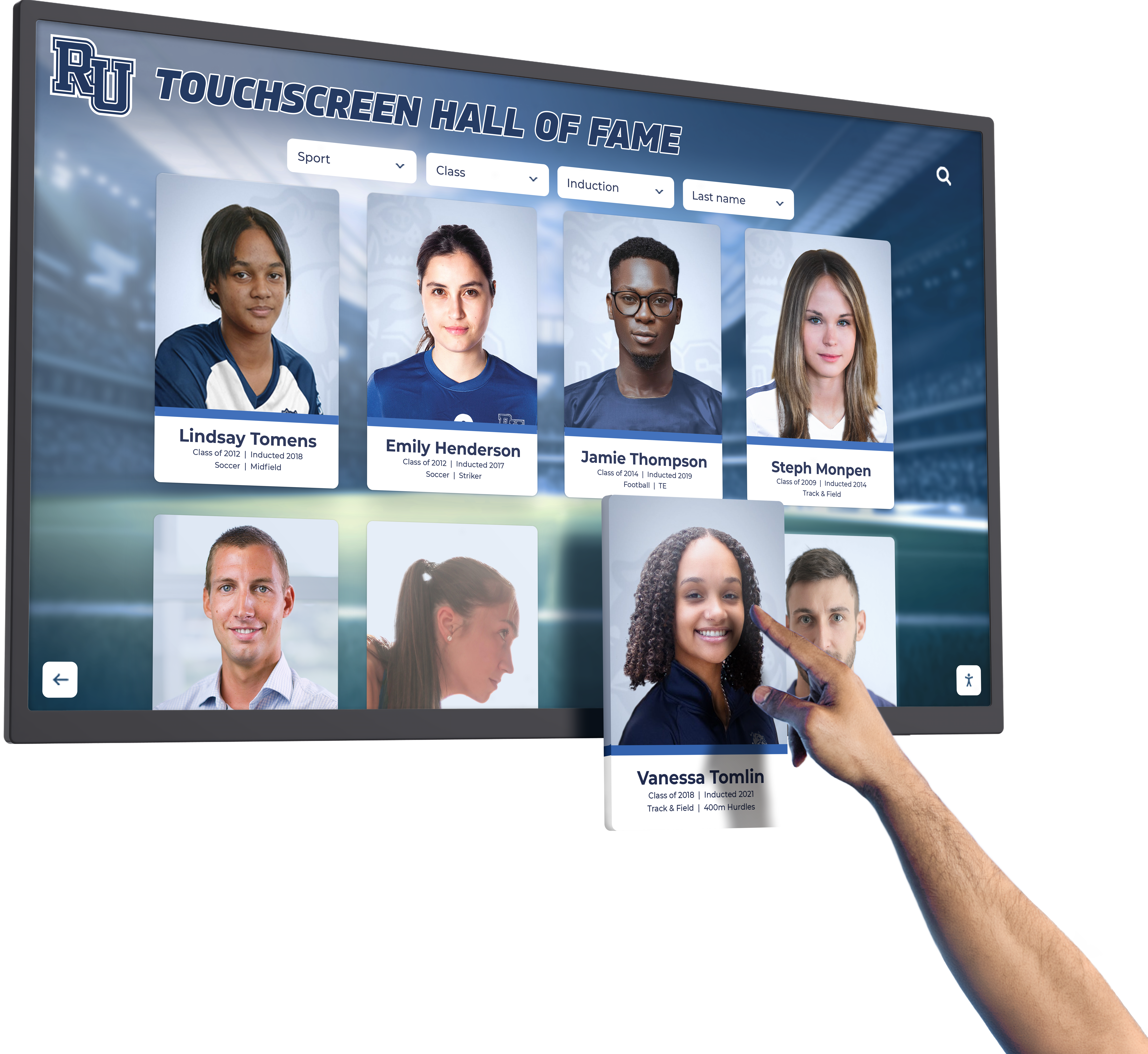
Intuitive touchscreen interfaces make exploring athletic records engaging for students, families, and visitors
Implementation Planning
Successful digital record system implementation requires systematic planning:
Phase 1: Research and Documentation
- Conduct comprehensive athletic history audit
- Photograph all existing physical record boards
- Digitize paper records and historical documentation
- Interview key stakeholders about record priorities
- Create spreadsheet databases organizing discovered information
Phase 2: Verification and Organization
- Cross-reference records across multiple sources
- Resolve conflicts and verify questionable performances
- Organize records by sport, category, and time period
- Create consistent formatting and presentation standards
- Develop athlete profile content and biographical information
Phase 3: Platform Selection and Setup
- Evaluate digital record board solutions
- Select appropriate hardware for display locations
- Choose content management platforms matching staff capabilities
- Plan for web integration extending record access
- Train administrators on system management
Phase 4: Content Migration and Launch
- Import historical records into digital system
- Upload photographs and supporting documentation
- Configure search and filter functionality
- Test user experience and navigation
- Plan launch event highlighting new system
Phase 5: Ongoing Management
- Establish update protocols for new records
- Schedule regular content audits
- Train new staff on system management
- Gather stakeholder feedback
- Continuously improve content and presentation
Record Preservation Best Practices
Long-term preservation requires attention to both physical and digital documentation.
Physical Document Preservation
Original documents deserve proper archival care:
Archival-Quality Storage
- Use acid-free folders and boxes for paper documents
- Store photographs in archival-quality sleeves
- Maintain climate-controlled storage environments
- Keep documents away from direct light exposure
- Handle historical materials with proper care
Digitization Priorities
- Scan fragile documents at high resolution before further handling
- Prioritize oldest and most deteriorated materials
- Create multiple digital copies with different storage locations
- Maintain organization systems linking physical and digital materials
- Document provenance and source information
Digital Preservation Standards
Digital records require systematic protection:
Backup Strategies
- Implement 3-2-1 backup rule: three copies on two different media types with one off-site
- Use multiple cloud storage providers
- Maintain local backup copies
- Schedule automatic backup processes
- Regularly test backup restoration procedures
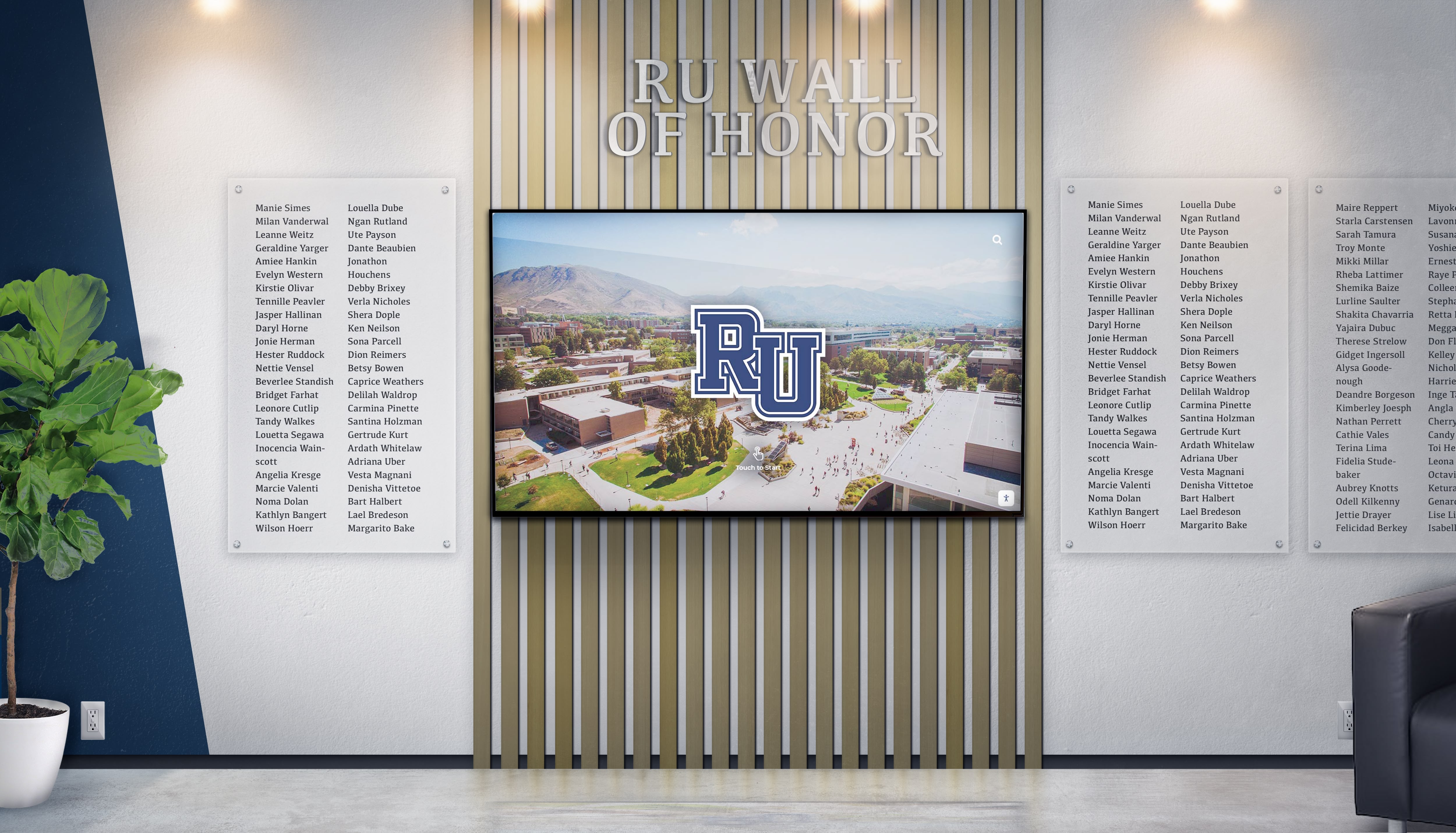
Modern preservation combines traditional elements with digital systems ensuring permanent accessibility
File Format Considerations
- Use widely-supported formats for long-term accessibility
- Convert proprietary formats to open standards
- Maintain both high-resolution originals and web-optimized versions
- Document file format choices and conversion processes
- Plan for future format migrations as technology evolves
Succession Planning
Record preservation extends beyond individual administrators:
Documentation of Systems and Processes
- Create comprehensive documentation of record-keeping procedures
- Maintain updated contact information for key stakeholders
- Document access credentials and system management information
- Train multiple staff members on all systems
- Create transition guides for new administrators
Institutional Knowledge Transfer
- Record interviews with long-serving coaches and administrators
- Document stories and context surrounding significant records
- Create written histories of program development
- Preserve institutional memory in accessible formats
- Establish mentoring systems for record-keeper transitions
Common Challenges and Solutions in Finding Sports Records
Understanding typical obstacles helps schools develop effective strategies.
Incomplete or Missing Historical Records
Many schools face significant gaps in athletic documentation:
Reconstruction Strategies
- Systematically search multiple sources for each missing time period
- Interview alumni athletes from underrepresented eras
- Research newspaper archives for meet results
- Contact state associations for championship documentation
- Accept uncertainty and document “best available information”
Prevention for Future Gaps
- Implement systematic current record documentation
- Create redundant backup systems
- Assign clear record-keeping responsibilities
- Establish annual archive review processes
- Train multiple staff on record systems
Conflicting or Uncertain Information
Inconsistent records require careful resolution:
Resolution Protocols
- Prioritize official meet results over secondary sources
- Consider reliability and proximity of different sources
- Document conflicts transparently rather than choosing arbitrarily
- Use qualifiers like “reported” or “according to” when verification proves impossible
- Establish criteria for determining “official” school records

Clear record documentation helps current athletes understand the achievements they're pursuing
Outdated Physical Record Boards
Deteriorating displays create preservation urgency:
Immediate Documentation Steps
- Photograph all physical boards comprehensively before further deterioration
- Transcribe information into digital databases
- Cross-reference board information with other sources
- Note obvious errors or inconsistencies
- Preserve boards themselves when historically significant
Modern Replacement Options
- Digital displays offering unlimited capacity and easy updates
- Hybrid approaches combining traditional elements with digital components
- Web-based systems extending access beyond physical locations
- Cloud-managed solutions eliminating physical update requirements
Schools replacing traditional boards discover that modern digital wall of fame solutions preserve historical records while enabling ongoing updates without physical access requirements.
Engaging Stakeholders Through Sports Records
Athletic records create engagement opportunities across multiple audiences.
Current Athlete Motivation
Records provide powerful motivation for student-athletes:
Record Awareness Programs
- Display records prominently in athletic facilities
- Share record progressions during seasons
- Recognize athletes approaching records
- Celebrate new records immediately
- Create “record watch” communications
Performance Context
- Help athletes understand historical significance of performances
- Connect current athletes with record-holding alumni
- Share stories behind record-setting achievements
- Highlight record progression over time
- Use records to set performance goals
Alumni Connection and Pride
Athletic records strengthen alumni engagement:
Alumni Record Recognition
- Feature record-holding alumni prominently
- Contact record holders when records are approached or broken
- Create alumni profiles showcasing athletic and life achievements
- Invite record holders to athletic events and ceremonies
- Share historical records through alumni communications
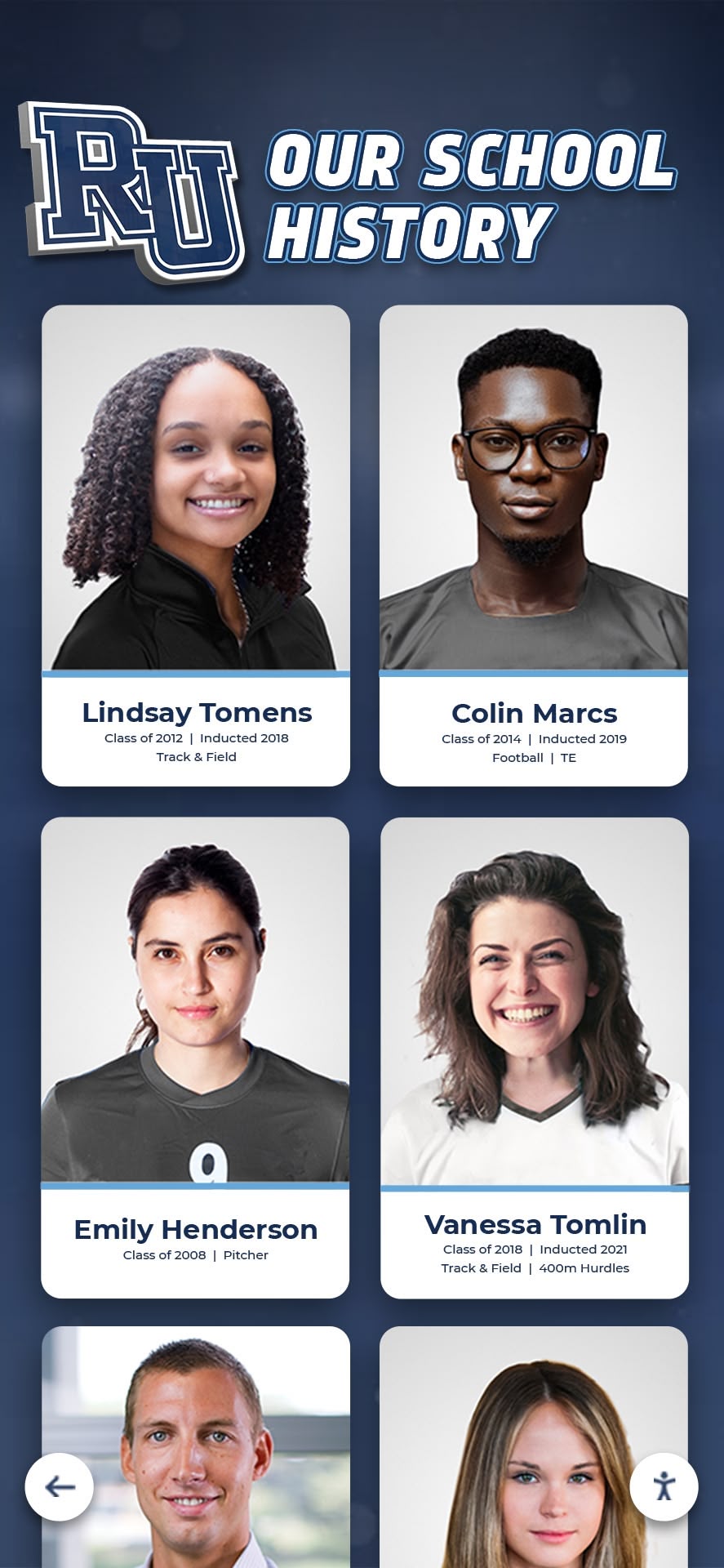
Comprehensive record systems strengthen connections between alumni and current athletic programs
Historical Context for School Pride
- Showcase program evolution and development
- Highlight championship eras and dominant teams
- Feature breakthrough athletes who established program standards
- Document facility improvements and program milestones
- Connect records to broader school history
Community Engagement
Sports records create community conversation and pride:
Media Relations
- Provide easy access to records for media coverage
- Share record-breaking achievements with local media
- Create compelling stories around significant records
- Maintain updated media guides with comprehensive records
- Facilitate historical research for feature articles
Family Engagement
- Enable families to explore athlete records and achievements
- Provide web access to school records
- Share record updates through family communications
- Include record information in athletic program materials
- Celebrate family athletic legacies across generations
Measuring Success of Record-Keeping Initiatives
Effective programs demonstrate clear value and impact.
Quantitative Metrics
System Usage Statistics
- Digital display interaction rates
- Web portal traffic and engagement
- Search query patterns revealing interest areas
- Most-viewed records and athlete profiles
- Time spent exploring record information
Administrative Efficiency
- Time required for record updates
- Number of records properly documented and verified
- Comprehensiveness of record coverage across sports
- Response time for record verification requests
- Reduction in physical record maintenance requirements
Qualitative Indicators
Stakeholder Feedback
- Athlete awareness of and interest in school records
- Alumni satisfaction with record preservation and access
- Coach assessment of record system usefulness
- Family engagement with athletic history
- Community perception of program prestige

Effective record systems create engaging experiences for all stakeholders while preserving athletic heritage
Cultural Impact
- Athlete motivation and goal-setting using records
- Team culture emphasizing pursuit of excellence
- Institutional pride in athletic tradition
- Strengthened connections between past and present
- Enhanced recruitment conversations highlighting program history
Future Trends in School Sports Record Management
Technology continues evolving how schools track and display athletic achievements.
Emerging Technologies
Artificial Intelligence Integration
- Automated record identification from meet results
- Statistical analysis identifying record trends
- Predictive analytics for record progression
- Automated content generation for athlete profiles
- Smart search functionality understanding natural language queries
Enhanced Multimedia
- Video integration showcasing record performances
- Virtual reality experiences of championship moments
- Augmented reality overlays on physical displays
- Audio narratives telling record stories
- Interactive timelines visualizing program evolution
Real-Time Data Integration
- Live competition results automatically updating displays
- Instant record verification and notification systems
- Integration with timing and scoring systems
- Automated social media posting for new records
- Real-time comparison to existing records during competitions
Evolving Expectations
Modern stakeholders expect comprehensive digital access:
Personalization
- Customized views based on user interests
- Alumni ability to follow their records
- Athlete-specific dashboards showing personal progression
- Family access to multi-generational athletic history
- Coach tools tracking team record pursuits
Cross-Platform Accessibility
- Seamless experience across physical displays, websites, and mobile apps
- Social media integration for record sharing
- Integration with school athletic apps
- QR code access to detailed record information
- Voice-activated search and navigation
Conclusion: Preserving Athletic Excellence for Future Generations
Finding and preserving school sports records represents essential work that honors past achievements while inspiring current and future athletes. When schools systematically document athletic accomplishments—from individual performance records to championship team achievements—they create tangible connections between eras while motivating students to pursue their own place in institutional history.
The strategies explored in this guide provide comprehensive frameworks for locating records across traditional and modern sources, verifying information through systematic cross-referencing, and implementing preservation solutions ensuring permanent accessibility. From digitizing fragile historical documents to implementing interactive digital displays that make finding specific records effortless, these approaches transform athletic record management from fragmented systems to comprehensive platforms celebrating excellence across all sports and time periods.
Transform Your Athletic Record Management
Discover how modern digital record solutions can help you preserve, display, and celebrate every athletic achievement in your school's history.
Explore Record SolutionsThe transition from traditional record-keeping approaches to modern digital systems accomplishes far more than administrative efficiency—it ensures that no achievement is lost to time, deterioration, or institutional turnover. Digital platforms eliminate space constraints that force schools to choose which records receive visibility, provide instant updates as new standards are established, and create engaging experiences that make exploring athletic history intuitive and enjoyable.
Start where you are with the records and documentation you currently possess, then systematically expand through archival research, stakeholder interviews, and technology implementation. Every record you document and preserve honors the athletes who achieved excellence while motivating current students to pursue their own extraordinary performances.
Your school’s athletic achievements deserve permanent preservation and accessible celebration. With thoughtful research, appropriate verification standards, and modern display technology, you can create comprehensive record systems that honor every achievement while building the positive, tradition-rich athletic culture where future records will be established.
Ready to begin? Explore digital swim record board solutions for aquatic programs, learn about comprehensive state championships recognition approaches, or discover winter sports hall of fame implementations that celebrate cold-weather athletic excellence.




































